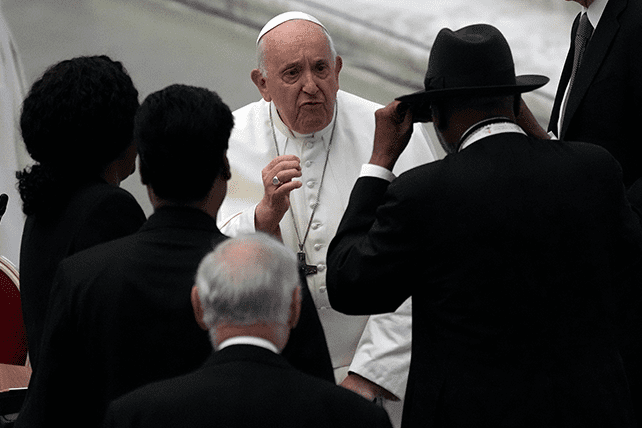NAIROBI, Kenya (RNS) — As a summit of Catholic bishops in Rome considers allowing priests to marry, a young Kenyan clergyman drew attention to the question of celibate priests on Sunday (Oct. 22) when he married a woman and was ordained in the Catholic Charismatic Church, a splinter tradition, on the same day.
The Rev. Edwin Githang’i Waiguru, a former Roman Catholic missionary who had served in the United States and Haiti, said marriage was a dream come true for him. Before Sunday’s wedding, Waiguru had lived in an African traditional marriage and had become the father of two children. Though never ordained, Waiguru made headlines for publicly celebrating his journey.
“I joined the seminary almost 20 years ago. I am also grateful that God has seen it worth to use me to bring something new to the world,” Waiguru told journalists after wedding in Ikinu, Githunguri area, near Nairobi. “It is possible to serve God, have a family and a lovely wife.”
Other former Catholic priests here are hoping the prelates gathered for the Synod on Synodality at the Vatican get the Waigurus’ message.
Ahead of the nearly monthlong synod, now in its final week, discussions among Catholics in dioceses around the world had put the topic of married priests, along with the prospect of women deacons and blessings for same-sex unions, on the agenda.
“We are following very closely with a lot of surprises,” said the Rev. Peter Njogu, a former Catholic priest who is now a bishop of the Restored Apostolic Church in Kenya, which he formed after leaving the Catholic Church.
“The pope has said there is no celibacy law that is cast in stone,” said Njogu. “They can change the celibacy rule — that mandatory celibacy for all serving clerics. We are following to hear if there is any change that can come, because that is the only way to solve the problems we are having in the church.”
Like the Charismatic Catholic Church, Njogu’s church uses Catholic Church doctrine and rites, differing only in the rite of ordination marriage. A number of similar splinter denominations have been recognized in Nigeria, Malawi, Zambia, South Africa and other countries on the continent.
The trend began in 2001 with Emmanuel Milingo, then archbishop of Lusaka, in Zambia, who defied the Vatican to marry Maria Sung, an acupuncturist from South Korea. In 2006 Milingo founded Married Priests Now, an organization advocating for the removal of the Catholic Church’s rules about celibacy.
Local bishops have actively opposed the former priests’ efforts, calling them “traitors” and warning people against joining their churches.
“I think this matter is being handled by our teams at the synod,” said an African Catholic bishop who did not wish to be named, “but I don’t see how one can break the rules and at the same time demand a change.”
The former priests point out that Catholics in many places are expressing support for married priests by moving to their dissenting churches, while still recognizing the supremacy of the pope.

